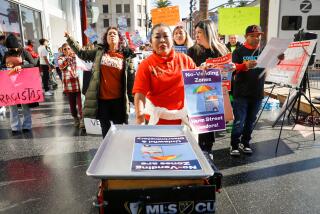Red Onion Chain Settles 39 Discrimination Claims
The Red Onion restaurant chain has agreed to a settlement with 39 people who complained that they were kept out of its nightclubs in Santa Ana, Fullerton and other Southland communities because they are black, Middle Eastern or Latino.
Under terms of the settlement negotiated by the state Department of Fair Employment and Housing, the Red Onion admitted no wrongdoing. However, restaurant attorney and vice president Stephen Solomon said Wednesday that each of the 39 complainants who sign the agreement will receive $500 from the restaurant.
Carol Schiller, assistant deputy director of the Fair Employment and Housing Department, said her office had sought “changes in practices that would have an impact on the community at large.”
“In light of the agreement reached, there is no reason to pursue the matter further,” she said, adding, however, that the restaurant’s “practices will be monitored.”
Each of the 39 complainants were mailed copies of the settlement July 23 and have 30 days from that date to respond, Schiller said, noting that complainants have the right to accept or reject the settlement.
“If they reject, (they may) file a private lawsuit,” Schiller said.
One of the complainants, Hamid Khan, said he was pleased, but he also was skeptical that it would result in long-term changes.
“I’m glad it got to this point, that something was done and somebody took notice,” said Khan, 29, a pilot and mortgage banker from Foun tain Valley.
Khan, who also has filed a civil lawsuit against the Red Onion over alleged discrimination, said he had not yet had time to decide whether the monetary settlement was severe enough.
“I’d rather have them do what they’re saying, but generally what you’ve seen in the past, they reach a settlement and then go back to their old tactics,” Khan said. “But you never know. They might clean up their act. If they do, great, more power to them.”
Red Onion official Solomon said the restaurant chain also will establish a $20,000 fund for people who may yet file complaints with the state through July 15, 1987.
However, Solomon said he does not expect a need for the additional money because the restaurant chain has recently adopted non-discrimination policies regarding admissions, hiring and training, and has begun documenting all incidents of patrons being turned away.
“We will be able to pinpoint anything that happened at the door,” Solomon said, adding that he does not believe any patrons will be refused admission because of race.
The settlement also calls for the Red Onion to publish a public apology in newspapers.
“People have a perception that they were inconvenienced,” Solomon said. “We apologize to people who don’t like the food or the quality of the dinner. We don’t like for anybody to feel they were inconvenienced at the restaurant.”
Purposes Accomplished
Schiller said the restaurant’s changes in policy, including its “efforts to hire more minorities as hosts” and attempts to increase the number of contracts given to minorities businesses, “accomplishes the purposes” of the state agency.
The Carson-based chain owns 14 restaurants in Southern California. Three lawsuits as well as the racial discrimination complaints have been filed against the company by people who had sought entrance to Red Onions in Santa Ana, Fullerton, Riverside and Palm Desert.
Former and current employees of the company’s outlets have told reporters that their bosses instructed them to “clean up the crowd” when it became “too dark” or to find something wrong with minority customers’ identification or clothing.
Company officials have repeatedly denied that the Red Onion discriminates, but vowed to “correct the perception of a problem.”
The settlement with the state was reached about July 15, but it was not announced immediately.
“We have a non-discrimination policy in effect,” Solomon said. “We want people coming in and spending their money.
“We’ve taken it as a positive lesson,” he said.
More to Read
Inside the business of entertainment
The Wide Shot brings you news, analysis and insights on everything from streaming wars to production — and what it all means for the future.
You may occasionally receive promotional content from the Los Angeles Times.










